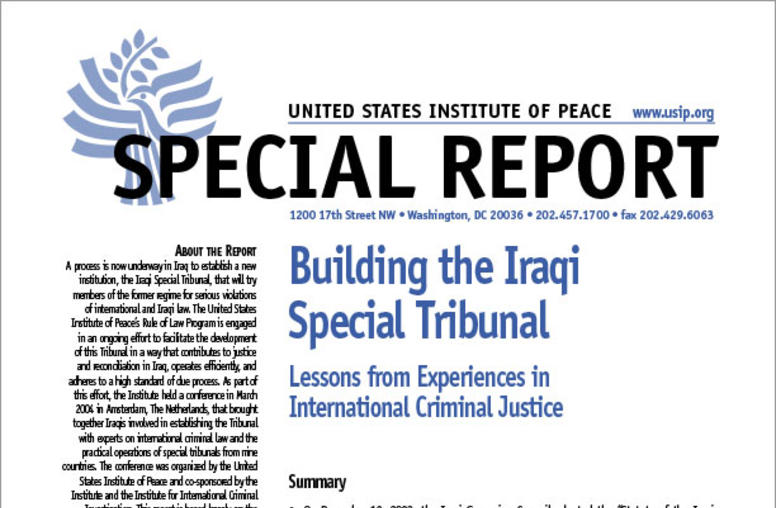Research & Analysis
U.S. Institute of Peace’s articles, reports, tools and other features provide policy analysis, research findings, and practitioner guides. These publications examine critical conflict issues at the center of the Institute’s work to prevent and resolve violent conflict.
The views expressed in these publications are those of the author(s).
Institute Training Program Helps Iraqis Identify And Pursue Core National Interests
USIPeace Briefing looks at a recent conflict management training session for Iraqis in Washington, D.C.
Peace Agreements: Iraq
Memorandum of Understanding between the United Nations and the Republic of Iraq (02-23-1998) Posted by USIP Library on: November 20 1998 Source Name: E-mail forwarded from Michael Gurstein to the UNReform listserv, citing the text obtained by the Associated Press. Source URL: Gurstein, M. (1998, Feb 26) UN-Iraq Agreement. UNReform [Online] Available E-mail: unreform@ccen.uccb.ns.ca (1998, Feb. 26) Date received via e-mail: February 23, 1998
Politics Should Not Delay Iraqi Elections
As the two-month countdown begins for the January 30 elections in Iraq, postponement is a subject of intense debate in both Iraq and the United States.

Donor Activities and Civil Society Potential in Iraq
The $87 billion Emergency Supplemental Appropriations Act for Defense and for the Reconstruction of Iraq and Afghanistan, 2004, signed by President Bush on November 6, 2003 (Public Law 108-106) made available to the United States Institute of Peace $10 million for “activities supporting peace enforcement, peacekeeping and post-conflict peacebuilding” in Iraq. Aiming at identifying areas in which the Institute might provide added value, the Institute undertook a preliminary mapping of donor ac...
Donor Activities and Civil Society Potential in Iraq (Arabic Edition)
Summary The rebuilding of Iraq is the most far-reaching reconstruction enterprise since the efforts in Europe and Japan at the conclusion of World War II. The vast bulk of the civilian Iraq funding is being spent in rehabilitating physical infrastructure. About $730 million is now programmed for democracy, civil society, human rights, and refugees, including the Institute’s conflict management activities.

Building the Iraqi Special Tribunal: Lessons from Experiences in International Criminal Justice
A process is now underway in Iraq to establish a new institution, the Iraqi Special Tribunal, that will try members of the former regime for serious violations of international and Iraqi law. The United States Institute of Peace’s Rule of Law Program is engaged in an ongoing effort to facilitate the development of this Tribunal in a way that contributes to justice and reconciliation in Iraq, operates efficiently, and adheres to a high standard of due process.
Building the Iraqi Special Tribunal: Lessons from Experiences in International Criminal Justice (Arabic Edition)
Summary On December 10, 2003, the Iraqi Governing Council adopted the "Statute of the Iraqi Special Tribunal," providing the legal foundation and laying out the jurisdiction and basic structure for the Tribunal that will be responsible for prosecuting acts of genocide, crimes against humanity, and war crimes committed in Iraq between 1968 and 2003.

Post-Conflict Iraq: A Race for Stability, Reconstruction, and Legitimacy
This report analyzes the institutional and social components that shape the politics of reconstruction in Iraq today. It chronicles the evolution of the Coalition Provisional Authority and the Governing Council, the dilemmas of dismantling the structures of state power consolidated under Saddam Hussein, the emergence of a vibrant civil society, and the tensions inherent in a new political order.
Postconflict Iraq: A Race for Stability, Reconstruction, and Legitimacy (Arabic Edition)
Summary In the wake of the overthrow of Saddam Hussein and his Ba'athist regime, two main tasks have confronted the Americans and Iraqis who now hold power. One is to stabilize the country; the other is to liberalize it economically, politically, and socially. Although the requirements of stabilization have so far overshadowed progress toward liberalization, significant steps have been taken in transitioning from totalitarianism to free market democracy. Much more, however, remains to...
Mosque and State: Religion and Politics in Iraq
A Special Discussion on Capitol Hill Sponsored by The Faith and Politics Institute and the United States Institute of Peace.